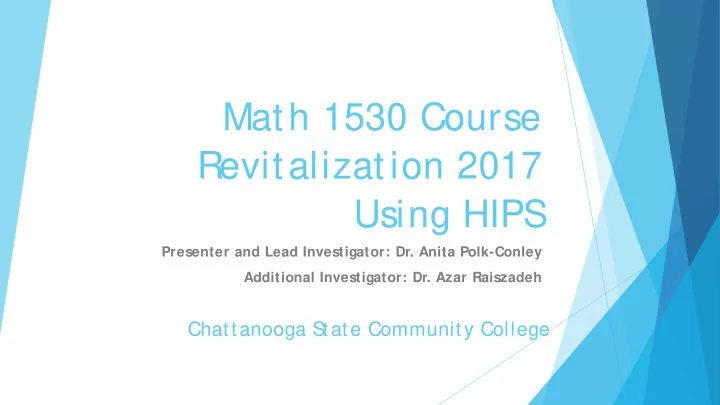

Math 1530 Course Revitalization 2017 Using HIPS Presenter and Lead Investigator: Dr. Anita Polk-Conley Additional Investigator: Dr. Azar Raiszadeh Chattanooga State Community College
The 1530/ 0530 Proj ect Included: High Impact Practice of proj ect-based learning using real world data Collaborative/ proj ect-based assignments for the both Math 1530 Introductory Statistics and Math 0530 learning support classes Data collected survey of Chattanooga State college level introductory statistics students with fifteen additional questions focused on healthy eating habits of students Four part proj ect grade replaced the final exam grade Classroom interactions student -to-student and student to faculty were completed on a weekly basis as students worked in groups to complete proj ect
Proj ect Results and Data: Math 1530 Intro Stats Fall 2017 Course Headcount NON-Experimental Experimental Courses Courses ONLY S tudent S tudent GRADE GP A Count Percentage GRADE GP A Count Percentage A 4.00 302 28.1% A 4.00 16 22.9% B 3.00 221 20.6% B 3.00 19 27.1% C 2.00 127 11.8% C 2.00 13 18.6% D 1.00 27 2.5% D 1.00 3 4.3% F 0.00 216 20.1% F 0.00 6 8.6% FA 0.00 92 8.6% FA 0.00 5 7.1% W 0.00 90 8.4% W 0.00 8 11.4% Total 1.99 1075 100.0% Total 2.14 70 100.0%
Math 1530 Revitalization Results Experimental group has a higher overall success rate (68.6% ) than the non-experimental group (60.5% ) for passing with an A, B or C. Difference of 8.1% between the success rates for those students participating in the experimental sections versus other college level statistics students enrolled is a 13.4 percent increase Overall grade point average for all students who started in non- experimental sections of Introductory S tatistics Math 1530 was a 1.99 Course GP A versus a 2.14 Course GP A for the experimental sections Difference of 0.15 between the overall student course grade point averages translates into a 7.5% percent increase in overall course GP A for experimental sections This percent increase shows a positive significant impact on the depth of student learning when using the new model in college level statistic sections
Future Implications According to the data collected, the experimental group has a higher overall success rate than the non-experimental group for college-level statistics which positively addresses the academic problem S tudents performed significantly better when required to turn in their proj ects before unit test deadlines should be incorporated in statistics courses High Impact Practice of proj ect-based learning using real and relatable real world data can help students feel connected to statistics and works to keep students engaged in their learning process.
Recommend
More recommend